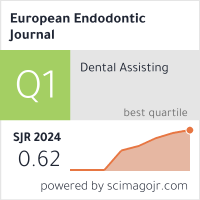Metrics
2024 IMPACT FACTOR
5 year Impact Factor
Eigenfactor Score
2024 CiteScore
Journal Citation Reports
(Clarivate 2025, JIF Rank)
Qualitative Assessment of the Surface Topographic Changes of XP-endo Shaper and TruNatomy files after exposure to Sodium Hypochlorite and Ethylenediaminetetraacetic Acid
Jerry Jose, Akshay Khandelwal, Riluwan SiddiqueDepartment of Conservative Dentistry and Endodontics, Saveetha Dental College, Saveetha Institute of Medical and Technical Sciences, Saveetha University, Chennai, IndiaObjective: TruNatomy and XP-endo Shaper are recently introduced file systems showing increased fatigue resistance rate. The present study aims to evaluate the surface topographic changes and nickel (Ni) and titanium (Ti) elemental loss of XP-endo Shaper (XPS) and TruNatomy (TN) files on exposure to conventionally used root canal irrigants; [5.25% sodium hypochlorite (NaOCl) and 17% ethylenediaminetetraacetic acid (EDTA)] at a 10 minute time frame using atomic force microscopy (AFM) and energy dispersion X-ray spectroscopy (EDX) analytical techniques.
Methods: Twelve samples for each of XPS (30/.04 taper) and TN (26/.04 taper; prime) instruments were dynamically exposed to 5.25% NaOCl, 17% EDTA separately for 10 minutes and in combination of 5.25% NaOCl (8 minutes)+17% EDTA (2 minutes) for a total of 10 minutes. Post exposure, the files were subjugated to AFM and EDX analysis. Independent t test and one-way ANOVA were used for statistical analysis, and the level of significance was set at 0.05.
Results: XPS and TN showed a significant increase of surface roughness (Ra) and roughness mean square (RMS) on exposure to various irrigants (P<0.05) using AFM analysis. Increased overall roughness was observed with TN in comparison to XPS (P<0.05). Elements Ni and Ti loss was found in both XPS and TN files using EDX analysis. Both files exhibited Ni and Ti loss with the loss of Ni content higher for TN after exposure to 17% EDTA. Loss of Ti was seen for both files on exposure to a combination of 5.25% NaOCl+17% EDTA.
Conclusion: After exposure to root canal irrigants, the surface roughness was lesser in XPS compared to TN files. 17% EDTA caused significantly higher surface roughness in both file systems when compared to 5.25% NaOCl. TN exhibited overall higher elemental (Ni and Ti) loss on exposure to 17% EDTA and 5.25% NaOCl+17% EDTA in comparison to XPS files. (EEJ-2020-12-275)
Keywords: Atomic force microscopy, EDTA, endodontics, root canal preparation, sodium hypochlorite
Manuscript Language: English
(1017 downloaded)



